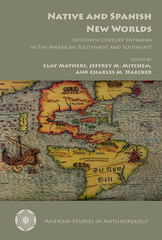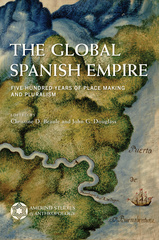The Archaeology of Native-Lived Colonialism
Challenging History in the Great Lakes
By Neal Ferris
The University of Arizona Press
Colonialism may have significantly changed the history of North America, but its impact on Native Americans has been greatly misunderstood. In this book, Neal Ferris offers alternative explanations of colonial encounters that emphasize continuity as well as change affecting Native behaviors. He examines how communities from three aboriginal nations in what is now southwestern Ontario negotiated the changes that accompanied the arrival of Europeans and maintained a cultural continuity with their pasts that has been too often overlooked in conventional “master narrative” histories of contact.
In reconsidering Native adaptation and resistance to colonial British rule, Ferris reviews five centuries of interaction that are usually read as a single event viewed through the lens of historical bias. He first examines patterns of traditional lifeway continuity among the Ojibwa, demonstrating their ability to maintain seasonal mobility up to the mid-nineteenth century and their adaptive response to its loss. He then looks at the experience of refugee Delawares, who settled among the Ojibwa as a missionary-sponsored community yet managed to maintain an identity distinct from missionary influences. And he shows how the archaeological history of the Six Nations Iroquois reflected patterns of negotiating emergent colonialism when they returned to the region in the 1780s, exploring how families managed tradition and the contemporary colonial world to develop innovative ways of revising and maintaining identity.
The Archaeology of Native-Lived Colonialism convincingly utilizes historical archaeology to link the Native experience of the eighteenth and nineteenth centuries to the deeper history of sixteenth- and seventeenth-century interactions and with pre-European times. It shows how these Native communities succeeded in retaining cohesiveness through centuries of foreign influence and material innovations by maintaining ancient, adaptive social processes that both incorporated European ideas and reinforced historically understood notions of self and community.
In reconsidering Native adaptation and resistance to colonial British rule, Ferris reviews five centuries of interaction that are usually read as a single event viewed through the lens of historical bias. He first examines patterns of traditional lifeway continuity among the Ojibwa, demonstrating their ability to maintain seasonal mobility up to the mid-nineteenth century and their adaptive response to its loss. He then looks at the experience of refugee Delawares, who settled among the Ojibwa as a missionary-sponsored community yet managed to maintain an identity distinct from missionary influences. And he shows how the archaeological history of the Six Nations Iroquois reflected patterns of negotiating emergent colonialism when they returned to the region in the 1780s, exploring how families managed tradition and the contemporary colonial world to develop innovative ways of revising and maintaining identity.
The Archaeology of Native-Lived Colonialism convincingly utilizes historical archaeology to link the Native experience of the eighteenth and nineteenth centuries to the deeper history of sixteenth- and seventeenth-century interactions and with pre-European times. It shows how these Native communities succeeded in retaining cohesiveness through centuries of foreign influence and material innovations by maintaining ancient, adaptive social processes that both incorporated European ideas and reinforced historically understood notions of self and community.
Ferris applies the new methods of historical archaeology to the Ojibwa, Delaware, and Iroquois of southern Ontario to produce a first rate account focusing on how Native communities navigated their way through the storm of British colonialism.’—L. M. Hauptman, co-author of The Oneida Indians in the Age of Allotment
Ferris applies the new methods of historical archaeology to the Ojibwa, Delaware, and Iroquois of southern Ontario to produce a first rate account focusing on how Native communities navigated their way through the storm of British colonialism.’—L. M. Hauptman, co-author of The Oneida Indians in the Age of Allotment
Neal Ferris holds the Lawson Chair of Canadian Archaeology at the University of Western Ontario.
List of Tables
Foreword, by Lisa Frink and Aubrey Cannon
Preface
Acknowledgments
1. Introduction
2. Imagining Different Pasts: Archaeological Histories of Native-Lived Colonialisms
3. Changing Continuities: Ojibwa Territorial Communities in Southwestern Ontario
4. Natives as Newcomers: The Delaware at Fairfield/Moraviantown
5. Iroquoian to Iroquois in Southwestern Ontario
6. Archaeological Histories of Native-Lived Colonialisms
Notes
References
Index

















